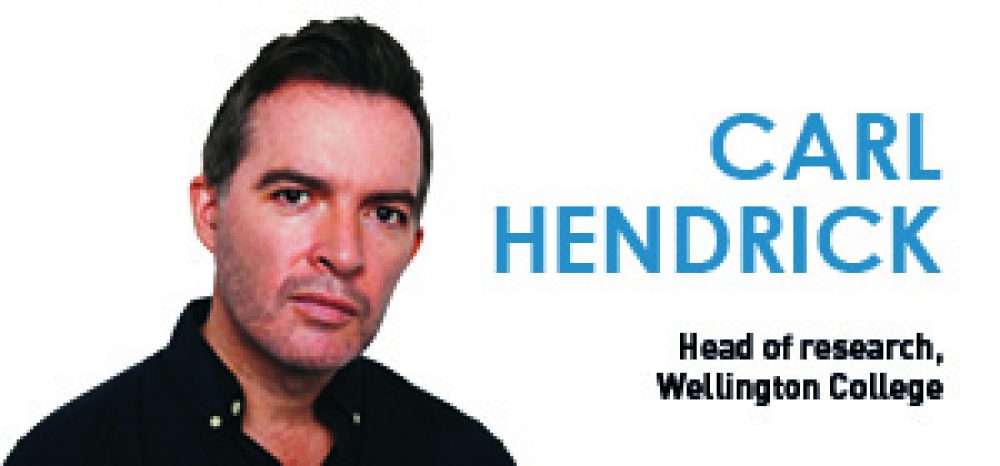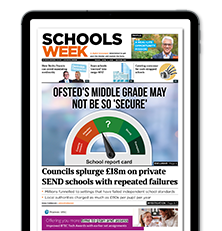Without knowledge there can be no meaningful analysis, argues Carl Hendrick, who isn’t that worried about the immediate future of AI
I read with interest the recent comments from Professor Rose Luckin and others, that advances in artificial intelligence will render the knowledge-based curriculum redundant, as students will be able to look up facts and information via technology.
While she’s absolutely right that students need to know how to navigate their way through fake news, denying the importance of knowledge and relying on technology is not the way to do it.
There is broad agreement in cognitive psychology that in order to think critically, one needs a fairly well developed schema of knowledge.
In other words, it’s very difficult, if not impossible, to think about something you don’t know. The extent to which we can think critically about something is directly related to how much we “know” about that specific domain and “knowing” means changes in long-term memory.
Understanding is remembering in disguise
Secondly and more importantly, we learn new material by relating it to what we already know. As Dan Willingham memorably observes, “understanding is remembering in disguise”.
The work of Nobel Prize-winner Herbert Simon shows that it’s mainly experts who can “look things up” in any meaningful sense, primarily because they have something to connect to new knowledge. This is primarily because their working memory isn’t taken up trying to comprehend basic information and so can concentrate on that new concepts.
This gap is most striking in vocabulary acquisition, where students who have a storehouse of words committed to long-term memory are able to fluently navigate their way through texts far more effectively than those with a more limited vocabulary, which has real implications for the achievement gap. Known as “the Matthew Effect”, essentially the rich get richer and the poor poorer.
One year, a GCSE English language exam contained an article with the word “vocation”. Several students didn’t know what it meant, guessing “vacation” and so answering the question wrongly.
No amount of generic critical thinking skills or meta-knowing would have helped students who were fundamentally cut adrift from the central meaning of the text. Being able to look up the word is of course useful but if all your cognitive bandwidth is constantly being used looking up the meaning of words not in your long-term memory, there is little room for critical thinking.
There is very little evidence that technology in schools leads to sustained pupil outcomes
Where are these schools that are teaching disembodied facts devoid of exposition? If they are truly teaching knowledge, they will be affording pupils lots of opportunity to use that knowledge to debate, reflect and think critically. I know of no school that privileges a knowledge-rich curriculum without the broader goal of enabling students to use that knowledge in a meaningful way.
Furthermore, narratives around technology, AI and a “fourth industrial revolution” herald a troubling era for the teaching profession.
Many of these claims come from corporate entities which want a revolution in education based on the filmiest of evidence. Assertions like these are part of what Audrey Watters calls the “Silicon Valley narrative” in which education is in some way “broken” and can only be saved by a bit of entrepreneurial magic.
Alarmingly, many proponents of “disruption” in education see the role of the teacher as disposable and one that can and should be replaced by technology in the way Amazon has replaced the high street store. There is very little evidence that technology in schools leads to sustained pupil outcomes; in fact it’s often quite the opposite.
A 2015 report from the OECD surveyed millions of students about the use of technology and found that technology had a detrimental effect on student achievement: “Students who use computers very frequently at school do a lot worse in most learning outcomes, even after controlling for social background and student demographics.”
If we are serious about closing the achievement gap, we need to look seriously at the evidence from cognitive psychology around how students learn and retain knowledge and more importantly, we need to listen to voices within our profession about pressing issues like workload and mental health, and not speculative forecasts about the future made by Silicon Valley entrepreneurs.
Carl Hendrick is head of research at Wellington College







Dan Willingham also said that story telling is psychologically privileged, and this is a good story. Cherry picked soundbites and snippets to support your view on the potential impact of AI.
For me, this is the danger of every Tom, Dick and Harry becoming a research purveyor, a little knowledge can be a dangerous thing. You have no real expertise in this area at all and yet you pontificate as if you were.
Your argument here is one of the weakest I have seen and quite why this publication thought it worthwhile including it would be an interesting debate I think.
To take one of your points directly, in the teaching/learning process the classroom teacher communicating directly with the learner in 2 way communication is quite often a redundant notion. Indeed most people learn about the teachings of Jesus from a book or even a well designed indepent learning resource (AI). Of course teachers can easily be replaced, dependent upon the conotext AKA Dunkin and Biddle (1974).
There isn’t a single valid reason in the post to support the argument that teachers will not be ditched in the future in favour of AI.
As for the title, I would guess that when faced with an unfamiliar issue you simply take to google and gather some information, quite often information resulting from the work of others doing the same think.
Of course AI will not in the near/medium term make all knowledge redundant but it will certainly reduce the amount of fringe/infrequently used knowledge that one has to keep in their heads. The knowledge isn’t redundant, just where it is stored.
This post will resonate with a good number of blinkered and more traditional teachers, but beyond that you will just come across as a bit of a luddite.